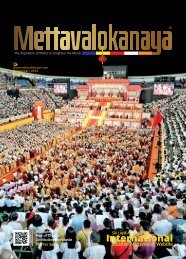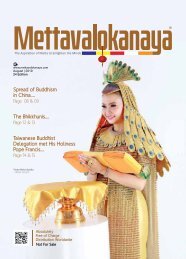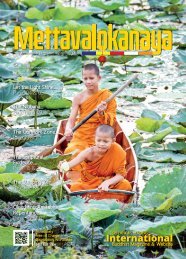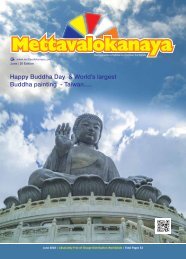Mettavalokanaya_Buddhist_Magazine_March_2019
“Mettavalokanaya” International Monthly Buddhist Magazine has been successfully distributed to 40 countries including all districts across Sri Lanka and now “Mettavalokanaya” is Sri Lankan Most Popular & Leading monthly Buddhist Magazine.
“Mettavalokanaya” International Monthly Buddhist Magazine has been successfully distributed to 40 countries including all districts across Sri Lanka and now “Mettavalokanaya” is Sri Lankan Most Popular & Leading monthly Buddhist Magazine.
Create successful ePaper yourself
Turn your PDF publications into a flip-book with our unique Google optimized e-Paper software.
“The gain<br />
to all with<br />
respectafully”….<br />
Gain,<br />
Honour and<br />
Praise….<br />
According to the Labha Sakkara<br />
Sutta, “At Savatthi... ‘Bhikkhus,<br />
dreadful are gain, honor, and<br />
praise; bitter, vile, obstructive<br />
to achieving the un-surpassed security<br />
from bondage. Suppose a fisherman<br />
would cast a baited hook deep into a lake,<br />
and a fish on the lookout for food would<br />
swallow it. That fish, having swallowed<br />
the fisherman’s hook, would meet with<br />
calam-ity and disaster, and the fisherman<br />
could do with it as he wishes. “‘Bhikkhus,<br />
‘fisherman’ is a designation for Mara the<br />
Evil One. ‘Baited hook” is a designation<br />
for gain, honor, and praise. Any bhikkhu<br />
who relishes and enjoys the aris-en gain,<br />
honor, and praise is called a bhikkhu<br />
who has swallowed the hook, who has<br />
met with calamity and dis-aster, and the<br />
Evil One can do with him as he wishes.1<br />
“‘Bhikkhus, once in the past there was a<br />
large family of turtles that had been living<br />
for a long time in a certain lake. Then one<br />
turtle said to another: ‘Dear turtle – do<br />
not go to such and such a region.’ “’But<br />
that turtle went to that region anyway,<br />
and a hunter struck him with a corded<br />
harpoon. “’Then that turtle approached<br />
the first one, and when he saw him<br />
coming in the distance he said to him:<br />
‘I hope, dear turtle, that you didn’t go<br />
to that region.’ “‘I did go to that region,<br />
dear.’ “‘I hope you haven’t been hit or<br />
struck, dear.’<br />
“‘I haven’t been hit or struck, but<br />
there is this cord constantly following<br />
behind me.’ “‘Indeed you’ve been<br />
struck! Your father and grandfa-ther<br />
also met with calamity and disaster on<br />
account of such a cord. Go now, dear<br />
turtle, you are no longer one of us.’<br />
“‘Bhikkhus, ‘hunter’ is a designation for<br />
Mara the Evil One. ‘Corded harpoon’<br />
is a designation for gain, honor, and<br />
praise. ‘Cord’ is a designation for delight<br />
and lust. Any bhikkhu who relishes and<br />
enjoys the arisen gain, honor, and praise<br />
is called a bhikkhu who has been struck<br />
with a corded harpoon, or who has met<br />
with calamity and disas-ter, and the<br />
Evil One can do with him as he wishes.<br />
“‘So dreadful, bhikkhus, are gain, honor,<br />
and praise; so bitter, vile, obstructive<br />
to achieving the unsurpassed se-curity<br />
from bondage. Therefore, bhikkhus,<br />
you should train yourselves thus: ‘We<br />
will abandon the arisen gain, honor, and<br />
praise, and we will not let the arisen gain,<br />
honor, and praise persist obsessing our<br />
minds.’”2 Ananda recites several more<br />
discourses until dana, which is being<br />
hosted by King Ajatasattu’s wife, Queen<br />
Vajira. She is the mother of his son,<br />
Prince Udayibhadda, and the daughter<br />
of King Pasenadi of Kosala.<br />
When the senior arahants<br />
approach the dana pavilion they notice<br />
the profusion of floral arrangements that<br />
abound throughout the enclosure. It is<br />
as if the queen has brought the entire<br />
contents of her palace garden to grace<br />
her offering to the monks. The flowers<br />
are of every hue and va-riety, and there<br />
are even individual bouquets in front of<br />
each of the five hundred seats for the<br />
arahants. Special arrangements of pure<br />
white lotus flowers are also placed on the<br />
banana leaf plates of the nine members<br />
of the sub-committee. Maha Kassapa,<br />
Ananda, and other elders approach the<br />
hall where the queen stands with her<br />
group of female attendants to greet<br />
them. “Is there a single flower left<br />
blooming in your garden?” asks Maha<br />
Kassapa as he approaches the regal<br />
personage of the queen, who is dressed<br />
in a flowing white sari trimmed in gold.<br />
“Not one, Venerable Sir,” answers the<br />
Queen as she bows low to pay her<br />
respects.<br />
“My husband the king requested<br />
that I offer every blossom to his<br />
esteemed guests to express his gratitude<br />
for showing him such great compassion<br />
two days ago. For the first time in years<br />
he was able to sleep well last evening,<br />
after having spent the previous night<br />
alone on top of this mountain. He said<br />
that his spirit has been refreshed by<br />
the experience of participating in your<br />
candid discussion, and he wanted me to<br />
tell you that he is re-inspired to dedicate<br />
the rest of his life to making his kingdom<br />
bloom for the greater glory of the<br />
Sasana.” Maha Kassapa and the other<br />
arahants smile at the queen, pleased<br />
that King Ajatasattu has benefitted from<br />
his excruciating emotional or-deal before<br />
the sub-committee. “King Ajatasattu has<br />
become a good man,” begins Ananda,<br />
“and I am sure that he will become an<br />
even better king, given his new understanding.”<br />
The queen bows in thanks<br />
for the kind compliment to her troubled<br />
husband. The arahants are escorted to<br />
their seats and Maha Kassapa begins the<br />
chants of blessing. That evening in the<br />
chairman’s torch-lit cave chamber the<br />
nine members of the sub-committee and<br />
ten memory monks gather to con-tinue<br />
their work.<br />
“I’m glad you chose to spare King<br />
Ajatasattu from this part of the Devadatta<br />
discussion,” says Ananda to Maha<br />
Kassapa. “I felt that he could be spared<br />
the ending of this tale, given what he<br />
went through two days ago,” responds<br />
the chairman. “Besides, apart from<br />
assisting Devadatta in two misguided<br />
attempts to murder the Buddha, the king<br />
had little to do with the way it ended.”<br />
“Perhaps I should preface this discussion<br />
with a quote from the Devadatta Sutta,<br />
which foreshadows his demise,” says<br />
Ananda. “Please proceed, Venerable<br />
Sir,” says Maha Kassapa. Ananda pauses<br />
for a moment and then begins: “’As<br />
its own fruit brings destruction To the<br />
plantain, bamboo, and reed, As its<br />
embryo destroys the mule, So do honors<br />
destroy the scoundrel.’” 3 “That verse<br />
so completely describes the fate of<br />
Devadatta after he succumbed to gain,<br />
honor, and praise, just as the fish by the<br />
fishhook and the turtle by the corded<br />
harpoon,” says Punna. After a moment<br />
Maha Kassapa says, “Going back to our<br />
recollec-tions, Devadatta was frustrated<br />
and enraged by the Buddha’s public<br />
re-fusal to allow him to take charge of<br />
the Sangha. Before he carried out his<br />
murderous attempts on the Buddha’s<br />
life he tried one last time to gain honor,<br />
praise, and power, which resulted in a<br />
schism in the Sangha.”<br />
“I heard that Devadatta consulted<br />
with a number of religious lead-ers from<br />
other sects that are still popular in this<br />
area. Many of them have harsh rules<br />
for members of their orders; one of<br />
them even forbids walk-ing on the grass<br />
because it might kill harmless insects.<br />
I think that’s how he came up with the<br />
idea that imposing new and constricting<br />
rules on the monks might gain him a<br />
greater following,” said Punna. “His<br />
ego was the sort that demanded there<br />
always be followers behind him.” “Even<br />
though he was no longer really welcome<br />
in the Sangha, Devadatta actually had<br />
the nerve to approach the Buddha again<br />
– and to make five new demands,” says<br />
Upali. “They were proposed additions<br />
to the Vinaya code of discipline that<br />
he used as a ruse in his attempt to divide<br />
the Order.” “Since this area is your<br />
specialty, Upali, why don’t you tell us<br />
about those five demands, as well as<br />
the Buddha’s responses,” requests<br />
Maha Kassapa. Upali sits up straight<br />
and begins, “Devadatta’s first request<br />
was that monks should live in a forest<br />
hermitage all their lives. He said that<br />
any monk who lives in a monastery near<br />
a village would be guilty of an offense.4<br />
“His second request was that all monks<br />
should only eat food they collected on<br />
alms rounds; any monk who accepted<br />
an invitation from lay people would be<br />
guilty of an offense. “The third new rule<br />
was that all monks should only wear<br />
robes made from old rags sewn together.<br />
He proposed that a monk who ac-cepts<br />
new robes offered by laypeople would<br />
be committing an offense. “Devadatta’s<br />
fourth new rule was that all monks<br />
should always dwell at the base of trees,<br />
and that any monk who goes and lives in<br />
a monastery would be guilty of breaking<br />
the code of discipline.<br />
USA<br />
Chief Sangha Nayake Thero<br />
of America and President<br />
of USA & Canada Sanga<br />
Council, Chief Abbot &<br />
President of Dharma Vijaya<br />
<strong>Buddhist</strong> Vihara, Los Angeles,<br />
California, USA.<br />
Most Venerable Aggamaha<br />
Pandita Dr. Walpola<br />
Piyananda Thero<br />
44 l <strong>Mettavalokanaya</strong> l <strong>March</strong> l <strong>2019</strong> l www.mettavalokanaya.com www.mettavalokanaya.com l <strong>2019</strong> l <strong>March</strong> l <strong>Mettavalokanaya</strong> l 45
















